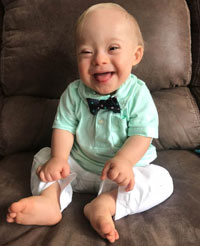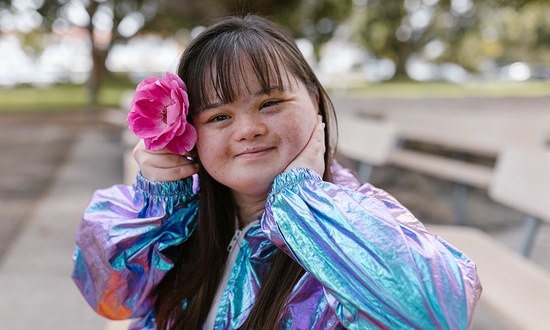Years ago, the television series “Life Goes On” portrayed a teenager named Corky who had Down syndrome. The starring role was played by a young man with Down syndrome, and many people were touched by his winsome performance. Critics raved. But many of the same critics favor the killing of these children, just like Corky, before they are born.
A survey of pediatricians and pediatric surgeons revealed that more than two out of three would go along with parents’ wishes to deny lifesaving surgery to a child with Down syndrome. Nearly three out of four said that if they had a Down syndrome child, they would choose to let him starve to death. [1] This is not only horrible, but baffling, for many Down children are the happiest you’ll ever meet. These children require special care, of course, but surely they deserve to be born and to live as much as any of us. (Over the years, the most popular character in my novel Deadline has been a Down syndrome boy named Little Finn. He also appears in my novel Dominion. In Deadline, I also portray another Down syndrome child teaching people in Heaven, with a startling depth of insight.)
Some argue: “It’s cruel to let a Down syndrome or handicapped child be born to a miserable and meaningless life.” We may define a meaningful life one way, but we should ask ourselves what is meaningful to the handicapped themselves:
A 2011 study by Harvard University researchers found that rather than leading lives of suffering, people with Down syndrome have unusually high rates of happiness. An amazing 99 percent said they are happy with their lives, 97 percent like who they are, and 96 percent like how they look. “Overall, the overwhelming majority of people with Down syndrome surveyed indicate they live happy and fulfilling lives,” the researchers found. [2]
“A slew of recent studies has shown that people with Down syndrome report happier lives than us ‘normal’ folk. Even happier than rich, good looking and intelligent people.” [3]
Wouldn’t you suppose we’d want more people of any group characterized by such happiness? Tragically, however, studies show that of mothers who receive a positive diagnosis of Down syndrome during the prenatal period, 89 to 97 percent choose abortion. [4] This means that the children most likely to be happy are also most likely to be killed before birth. Reports show that Iceland’s abortion rate for unborn Down syndrome babies is almost 100%. Denmark’s is 98%. [5]
When adults kill a handicapped child, preborn or born, they may think it's for her or his good, to prevent future suffering. But in doing so, they aren’t preventing cruelty to the child; they’re committing cruelty to the child. And in reality, it’s most often done in order to prevent difficulties for themselves and others.
I was touched by a video of Charlotte Fien, a British young woman who eloquently challenged a UN “expert” on human rights who advocates for aborting Down syndrome babies.
Here’s a transcript of what Charlotte said:
Mr. Ben Achour, your comments about people with Down syndrome deeply offend me. I felt you attacked me for being who I am. Who am I, Mr. Ben Achour? I’m a human being just like you. Our only difference is an extra chromosome. My extra chromosome makes me far more tolerant than you, sir. . . . If any other heritable traits like skin color were used to eradicate a group of people the world would cry out. Why are you not crying out when people like me are being made extinct? What have WE done to make you want us to disappear? As far as I know my community doesn’t hate, discriminate, or commit crimes. . . .
I keep hearing you use the word “suffering” in relation to Down syndrome. The ONLY thing we have to suffer are horrible people who want to make us extinct. I have a brilliant life. I have a family that loves me. I have great friends. I have an active social life.
Mr. Ben Achour, what you are suggesting is eugenics. It’s disgusting and evil. You need to apologize for your horrible comments. You should also be removed from the Human Rights Committee as an expert. You are not an expert about Down syndrome. You sir, do not speak for my community. The Human Rights Committee needs people who will genuinely fight for the rights of others who are being oppressed. I suggest that the Human Rights Committee appoint me as an expert. I will fight for our right to exist for the rest of my life.
Charlotte is joined by a chorus of courageous individuals with Down syndrome who are speaking out about their right to life. In her TEDx talk, my fellow Oregonian Karen Gaffney asked, “I have one more chromosome than you. So what?” An accomplished open-water swimmer, Karen has crossed the English Channel in a relay race and completed the swimming leg of the Escape from Alcatraz triathlon.
Last year, 18-year-old Natalie Dedreux from Cologne asked German Chancellor Angela Merkel a tough question about Germany’s abortion laws: “Mrs. Merkel, you are a politician. You make laws. I’m an editor at a magazine for people like me who have Down syndrome. Nine out of ten babies with Down syndrome in Germany aren’t born. A baby with Down syndrome can be aborted days before the birth, in what is called ‘late stage abortion.’ My colleagues and I want to know what your opinion on late-stage abortion is, Mrs. Merkel. Why can babies with Down syndrome be aborted shortly before birth?”
“I don’t want to be aborted, I want to be born,” Natalie concluded, to applause.
When Frank Stephens, a young man with Down syndrome, gave a speech before a U.S. House appropriations panel, he told members of Congress, “Just so there is no confusion, let me say that I am not a research scientist. However, no one knows more about life with Down syndrome than I do. Whatever you learn today, please remember this: I am a man with Down syndrome and my life is worth living.”
 There is one recent positive sign in American society: Gerber named Lucas Warren, who has Down syndrome, as their 2018 Gerber Spokesbaby. Looking at Lucas’s precious smile, how could there be any doubt that he and other children with Down syndrome have lives worth protecting and cherishing?
There is one recent positive sign in American society: Gerber named Lucas Warren, who has Down syndrome, as their 2018 Gerber Spokesbaby. Looking at Lucas’s precious smile, how could there be any doubt that he and other children with Down syndrome have lives worth protecting and cherishing?
[1] Curtis Young, The Least of These (Chicago, IL: Moody Press, 1983), 118.
[2] Marc A. Thiessen, “When will we stop killing humans with Down syndrome?,” The Washington Post, March 8, 2018.
[3] Jevan, “People with Down Syndrome Are Happier than Normal People,” The Tribal Way (blog), October 2, 2012.
[4] H. Choi, M. Van Riper, and S. Thoyre, “Decision Making Following a Prenatal Diagnosis of Down Syndrome: An Integrative Review,” Journal of Midwifery and Women’s Health 57, no. 2 (March/April 2012): 156–164.
[5] Marc A. Thiessen, “When will we stop killing humans with Down syndrome?,” The Washington Post, March 8, 2018.
Top photo by Nathan Anderson on Unsplash




